About Israel
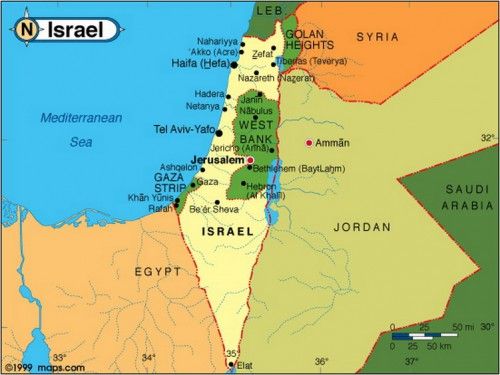 Israel boasts a highly advanced market economy that consists of a rapidly growing high-tech sector that is supported by a strong venture capital industry. With only a population of 8.38 million, Israel has a gross domestic product (GDP) of $299.4 billion in 2016. There are three languages spoken in Israel: Hebrew, Arabic, and English; all of which can be found in signage, making the country easily accessible.
Israel boasts a highly advanced market economy that consists of a rapidly growing high-tech sector that is supported by a strong venture capital industry. With only a population of 8.38 million, Israel has a gross domestic product (GDP) of $299.4 billion in 2016. There are three languages spoken in Israel: Hebrew, Arabic, and English; all of which can be found in signage, making the country easily accessible.
Before I departed for Israel, I brushed up on some common Hebrew phrases.
Israel has one of the largest diamond industries in the world and also possesses a substantive service sector. The energy sector in Israel is led by Alon Oil, an Israeli Energy company which operates several refineries on the U.S. West Coast, including California. Alon markets energy products in Israel. In addition, Zion Oil, although Texas based primarily, is involved in oil exploration in Israel. In addition, Israel also remains a world leader in telecommunications and software development.
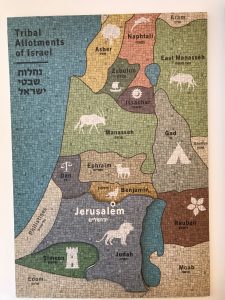
The Israeli high-tech industry has been developing and reaching new peaks each year, both in technological achievements and in sales. Intel Israel has been in operation since 1974, supporting four plus locations throughout the country. In addition, IBM also has several locations throughout Israel.
Israel has the third most companies listed on the NASDAQ following the US and China.
Israel’s main exports include cut diamonds, high-technology equipment and agricultural products, particularly fruits and vegetables. Israel is highly dependent on foreign imports of coal, petroleum, food and production inputs, especially since access to natural resources is relatively scarce within the country.
Tourism
Tourism has become a large industry for Israel as well, as it is a sought out tourist destination for the country’s religious significance, historical sites, architecture, temperate climate, beaches and unique geography. Despite past security concerns with neighboring countries, Israel attracts millions of tourists annually.

Free Trade Agreements
In September 2010, Israel became a member of the Organization for Economic Co-operation and Development (OECD). The country has signed several free trade agreements, in addition to the one with the U.S., Israel has trade agreements with the European Union, the European Free Trade Association (Iceland, Liechtenstein, Norway and Switzerland), Canada, Mexico, Jordan, Turkey, Czech Republic and Slovakia, Poland, Hungary, Romania, and Bulgaria. In 2011, Israel signed a trade agreement with MERCOSUR, and also has an agreement with India and China that is under discussion.
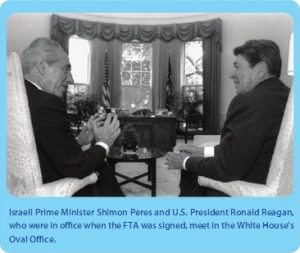 The U.S.-Israel FTA was the first FTA entered into by the United States and serves as a foundation for expanding trade and investment between the U.S. and Israel by reducing barriers and promoting regulatory transparency. In 2016, U.S. exports were over $13.1 billion, causing Israel to be the 21st largest export destination. Bilateral trade with Israel totaled $35.3 billion in 2016. Main U.S. exports to Israel include miscellaneous manufactured commodities, computer and electronic products, transportation equipment and non-electrical machinery. Main U.S. imports from Israel include miscellaneous manufactured commodities, chemicals, and computer and electrical products. The FTA is a short 15 pages long, and may need to be updated to include e-commerce etc.
The U.S.-Israel FTA was the first FTA entered into by the United States and serves as a foundation for expanding trade and investment between the U.S. and Israel by reducing barriers and promoting regulatory transparency. In 2016, U.S. exports were over $13.1 billion, causing Israel to be the 21st largest export destination. Bilateral trade with Israel totaled $35.3 billion in 2016. Main U.S. exports to Israel include miscellaneous manufactured commodities, computer and electronic products, transportation equipment and non-electrical machinery. Main U.S. imports from Israel include miscellaneous manufactured commodities, chemicals, and computer and electrical products. The FTA is a short 15 pages long, and may need to be updated to include e-commerce etc.
Israel is California’s 17th largest export destination, as California exported over $2 billion to Israel in 2016. Miscellaneous manufactured commodities is the largest export category for California, with over $1 billion, representing nearly 55.4 percent of all state exports to Israel. Other major export categories to Israel include computer and electronic products, machinery (except electrical), and agricultural products, totaling 15.9, 8.9, and 4.2 percent of all export commodities respectively.
Israeli Defense Forces
The Israeli Defense Forces (IDF) are well known throughout the world, especially for their intelligence capabilities. They differ from other militaries as the IDF makes up ground forces, air force, and navy. Mandatory conscription is required of both male and female Israeli citizens, although Arab citizens and ultra-Orthodox Jews are exempted if they please. Men typically serve for 32 months, and women for two years, although service may be longer depending on the individual’s specialty. The number of wars and border conflicts the IDF has been involved in since its inception in 1948 makes it one of the most battle-trained armed forces in the world. The IDF is one of Israel’s most prominent institutions, influencing the country’s economy, culture, and politics. The IDF has had close relations with the U.S.
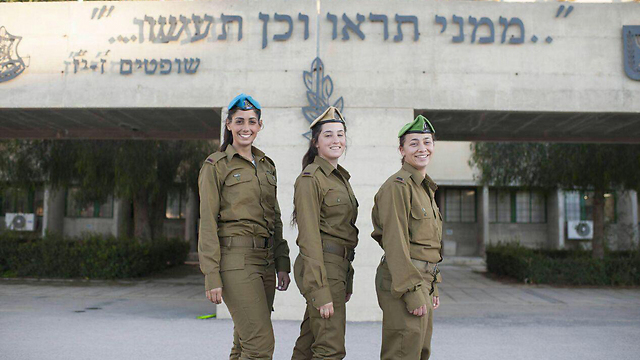
Marked Occasions
2017 Balfour 100 Year Anniversary
The Balfour Declaration, named after Britain’s Foreign Secretary Arthur Balfour in 1917, was a public statement issued by the British government during World War I announcing support for the establishment of a national home for the Jewish people in Palestine, which was then an Ottoman region with a minority Jewish population. This declaration was issued on November 2, 1917 after being created without representation from the local population in Palestine. The declaration had several consequences, some positive and some negative. It greatly increased popular support for Zionism, while it unfortunately led to hostility between Israel and Palestine which is believed to be the origin of the ongoing conflict still today. The 100-year anniversary celebrates how far the Jewish people have come since the declaration in creating a country that is prosperous and recognized globally for its many achievements. Balfour100 and CelebrateBalfour.
1947 Partition Anniversary
The Partition Plan for Palestine was proposed by the United Nations in 1947 which recommended a partition of Mandatory Palestine at the end of the British Mandate. It recommended the creation of independent Arab and Jewish States and a Special International Regime for the city of Jerusalem. However, the plan was never implemented as a civil war broke out after the resolution was adopted by the UN General Assembly. 2017 is the 70th anniversary of the Partition Plan. To commemorate the anniversary, the Israeli Mission to the UN has decided to host a reenactment of the historic vote. The reenactment will celebrate the historic day and everything Israel has accomplished in the past 70 years. It was also serve as a reminder of the support the country received in the days of its establishment, despite the ongoing battle Israel faces at the UN.
Nov 4, 2017 Anniversary of PM Rabin Assassination
Yitzhak Rabin was the Prime Minister of Israel for two terms, 1974-1977 and 1992 until his assassination in 1995. Rabin was a career soldier having served for 27 years in the Israeli Defense Forces and he was also Israel’s ambassador to the U.S. before his first term as Prime Minister. In 1992, Rabin was re-elected as Prime Minister on a platform of embracing the Israeli-Palestinian peace process. He had signed several historic agreements with the Palestinian leadership as part of the Oslo Accords. However, on November 4th, 1995 while attending a mass peace rally, Rabin was assassinated by a right-wing extremist who opposed the signing of the Oslo Accords. The shooter was immediately seized by the Prime Minister’s bodyguards and subsequently sentenced to life in prison. Hundreds of thousands of Israelis mourned Prime Minister Rabin’s death and the square where the incident occurred was renamed after him in his honor. November 4th, 2017 marks the 22nd anniversary of his death. Memorial services were held on the anniversary of his assassination, according to the Hebrew calendar, across Israel for the man who many believed could bring peace to the country. Parliament held a special session where Prime Minister Netanyahu called for national reconciliation and unity.
Water, Agriculture, and Technology
In reading Seth Siegel’s Let There Be Water, the book illustrates (excerpts below) how Israel can serve as a model for the United States and others how to blunt coming water calamities. Even with 60 percent of its country made of desert, Israel has not only solved its water problems; it has an abundance of water. Israel even supplies water to its neighbors – the Palestinians and the Kingdom of Jordan – every day.
The author describes five trends which are drivers of a water crisis: population, rising middle class, climate change, tainted water, and leaks.
Israel is a water respecting culture, which goes back to ancient times and writings. A series of laws passed by the Knesset have resulted in a state controlled and centrally planned approach to water. Israelis widely believe that the collective approach is the secret to nations’ success in water conservation, and have accepted the trade-off surrendering private ownership.
Mekorot is the Israeli national water utility. In 1964, the National Water Carrier opened creating a national water system, carrying water from the relatively water-rich north to farms in the water-poor south. In 1966, drip irrigation – first used in Israel – is offered for sale for the first time. In 2000, dual flush toilets (with claims as an Israeli invention) are made compulsory. From 2005-16, five seawater desalination (also a process developed in Israel) plants are built along the Mediterranean coast providing a majority of Israel’s drinking water. In October 2013, Israel declares independence from the weather.
By way of background, prior to drip irrigation, the norm was flood irrigation, then sprinkler irrigation and even airborne spray. Now with improved farming, Israel is a leader in plant research. Israeli seed companies conduct research in both traditional breeding and genetically modified, GMO. However, due to export market sensitivities – especially in the EU, Israeli farmers only use traditional seeds. Drip irrigation equipment can now be found in 110 countries.
Israel is a tiny country, about the size of New Jersey, but it has a wide variety of climates and altitudes- from sea level, but also at 700 feet below sea level at the Sea of Galilee (Israel’s largest source of fresh water), and at nearly 3,000 feet above sea level in Jerusalem. The water plan performs in wet chilly winters and the dry desert.
In March 2014, an Israeli – California water cooperation agreement was announced. This followed Governor Brown’s declaration of a drought state of emergency in January. Israeli Prime Minister Benjamin Netanyahu signed a MOU with Governor Brown in Silicon Valley. During the ceremony, the Prime Minister outlined Israel’s recycling of sewage for agriculture, drip irrigation, prevention of leaks, and desalination.
In Carlsbad, California, near San Diego – IDE Technologies, the Israeli desalination company – after ten years of delays caused by litigation and permitting – built a state of the art plant. This is the largest desalination plant in the Western Hemisphere, producing fifty million gallons of water a day or enough water for 400,000 Californians.
The Claude “Bud” Lewis Carlsbad Desalination Plant is a public-private partnership between the Water Authority and Poseidon Water. The Carlsbad plant uses reverse osmosis membrane technology to produce enough water to meet about 10% of the region’s water needs as a core supply of water regardless of weather conditions. The desalination project includes three main components: the desalination plant adjacent to the Encina Power Station on Agua Hedionda Lagoon; a 10-mile pipeline that connects to the Water Authority’s regional distribution system; and upgrades to Water Authority facilities for distributing desalinated seawater throughout the region.
With desalination, drip irrigation, water security, or valve-to-control room communication, Israel has used technology to improve water efficiency at a lower cost – and developed an export industry. The Clean- tech revolution that energy, water and sewage can be managed in a more efficient and environmentally friendly way has provided many opportunities for Israel.
Israel is often called the “Start-Up Nation” after the bestselling book by Dan Senor and Saul Singer. The book identifies several reasons for Israel’s success in the tech industries, including an entrepreneurial culture, a military that identifies and trains the best technology minds, and the global perspective that Israel’s isolation has spurred.
Another key reason is that Israel is a top spender on Research and Development, per capita. Israel has the highest GDP defense budget of any developed nation, and also spends over four percent of its GDP on R&D. Today more than 250 global companies have facilities in Israel. For many like Google, Facebook, Apple, Intel, Microsoft, IBM, HP, Motorola, GE, and Dell their R&D center in Israel is their first, largest or only R&D location outside their headquarters.
Today Israel uses or has used technology and hydro-diplomacy around the world including: China, Iran, many Lesser Developing Nations, and more recently India.
Air Industry
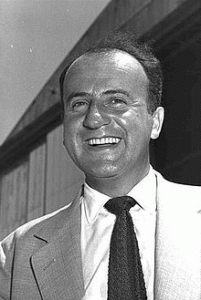
Israel’s air industry was pioneered by Al Schwimmer who was born in New York City to Jewish parents in 1917. In 1939 Schwimmer began his aerospace career at the Lockheed Corporation as an engineer. During World War II, he worked for Trans World Airlines and assisted the U.S. Air Transport Command as a flight engineer. Then, during Israel’s War of Independence in 1948, Schwimmer used his previous war experience and his contacts to smuggle surplus war planes to Israel as the fledgling state battled against the invading armies of its neighbors. He also recruited many pilots and crews to fly the planes to Israel, using winding routes; many of these men would become the nucleus of the Israeli Air Force. A year after Schwimmer’s return to the U.S. in 1949, he was convicted of violating the U.S. Neutrality Acts for smuggling the planes into Israel. He did not receive prison time, but was stripped of his voting rights, veteran benefits, and fined $10,000 (over $100,000 in today’s dollars). Schwimmer firmly believed his actions in helping to create a Jewish State were the right moral decision to make and nobly accepted the consequences. It wasn’t until 2001 that President Bill Clinton pardoned Schwimmer. In the early 1950s, Schwimmer was running an aircraft maintenance company in Burbank, California when he was approached by David Ben-Gurion, Israel’s then prime minister, who asked Schwimmer to return to Israel and establish an aircraft company for commercial and military purposes. Schwimmer accepted and returned to Israel to found the Israel Aerospace Industries of which he became the first CEO. Schwimmer died in Israel in 2011 five years after being awarded the Israel Prize for his lifetime achievement and contribution to society and the State of Israel.
Currency
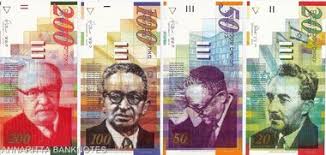
Currency in Israel is called the Israeli New Shekel, it uses the code ILS but is often followed by the abbreviation NIS to denominate prices. In case you’re wondering what happened to the old shekel, it had experienced frequent devaluations which led to its hyperinflation in the early 1980s. In 1985 an Economic Stabilization Plan introduced the new shekel, which replaced the old one at a rate of 1,000:1. Today, one NIS is equal to about 26 cents in USD. American credit cards are readily accepted throughout the country.
Sports
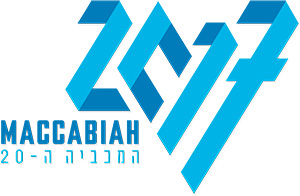 The Maccabiah Games are sometimes called the Jewish Olympics. Held every four years, they bring the best Jewish athletes in the world together for two weeks. For many Jews, participation in the Maccabiah Games, whether as an athlete or spectator, is their most important lifelong connection to Israel. Twenty years from conception to the first games in 1932, the Maccabiah was planned as a global competition that would take place in the Land of Israel, contrasting it with the Olympics on which it was modeled, which changes venue with each new Olympiad. The first Maccabiah Games attracted 390 athletes who came from eighteen countries. There was a second in 1935, but the rise of Nazism in Europe kept the games from being held again until 1950. Eight hundred athletes from nineteen countries participated in what were the first games held in an independent State of Israel. The competition was the first major global Jewish communal gathering after the Holocaust. (Excerpt from Let There Be Water by Seth Siegel). Today up to forty countries are represented.
The Maccabiah Games are sometimes called the Jewish Olympics. Held every four years, they bring the best Jewish athletes in the world together for two weeks. For many Jews, participation in the Maccabiah Games, whether as an athlete or spectator, is their most important lifelong connection to Israel. Twenty years from conception to the first games in 1932, the Maccabiah was planned as a global competition that would take place in the Land of Israel, contrasting it with the Olympics on which it was modeled, which changes venue with each new Olympiad. The first Maccabiah Games attracted 390 athletes who came from eighteen countries. There was a second in 1935, but the rise of Nazism in Europe kept the games from being held again until 1950. Eight hundred athletes from nineteen countries participated in what were the first games held in an independent State of Israel. The competition was the first major global Jewish communal gathering after the Holocaust. (Excerpt from Let There Be Water by Seth Siegel). Today up to forty countries are represented.
Jewish professional athletes in the U.S. are highly regarded in Israel. Omri Casspi, a NBA star now on the Golden State Warriors (previously one of Sacramento’s very own on the Kings) is a household name in Israel. He has traveled to Israel, taking his NBA teammates and the NBA Commissioner Adam Silver along with him, for a Basketball Without Borders camp. The camp brought together kids from 22 different countries and a variety of religious backgrounds.
In Summary…
According to the U.S.-Israel Business Initiative, Israel is an ever-growing partner for the United States in generating transformative innovation for American companies while creating high-skilled jobs in the US. Nearly half of the world’s top technology companies have bought start-ups or opened research and development centers in Israel. More than 300 foreign companies have established R&D centers in Israel with more on the way.
- Home
- About Israel
- Arriving in Israel:October 26, 2017
- Day 0:October 27, 2017
- Day 1:October 28, 2017
- Day 2:October 29, 2017
- Day 3:October 30, 2017
- Day 4:October 31, 2017
- Day 5:November 1, 2017
- Follow-Up/Resources
 Blog By
Blog By
(Mrs.) Susanne Stirling
Vice President, International Affairs
susanne.stirling@calchamber.com

